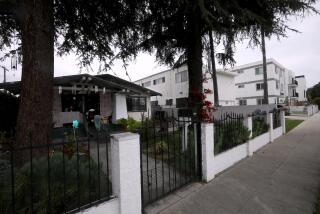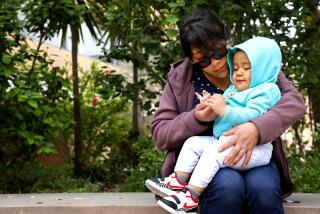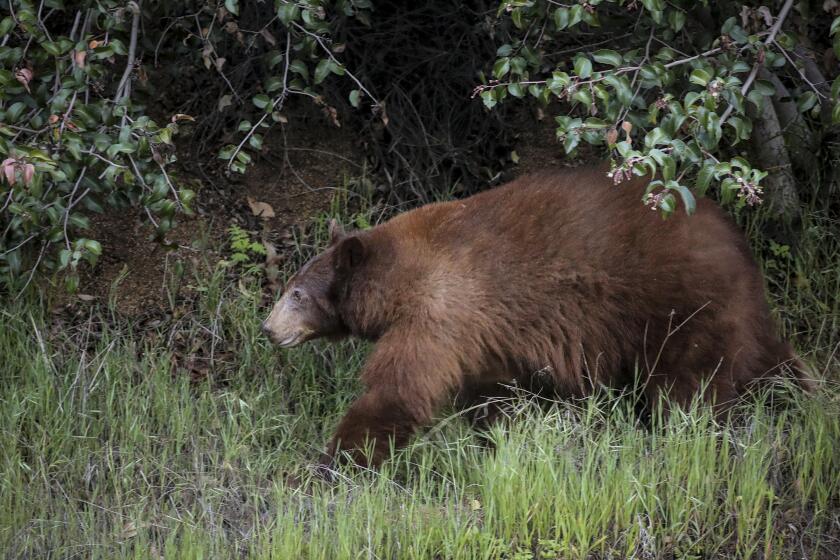A Second Panther Firefighter Is Killed : Violence: A gunman ends a quarrel and the life of Virgil Blandson, 23. The victim’s troubled life had taken a good turn when he joined the South-Central emergency reserve crew.
The South Central Panthers, the unlikely firefighting unit that forged a name for itself by setting aside gang conflicts in favor of teamwork under pressure, has lost a second member to the kind of street violence its members so often deplored.
Virgil Blandson, 23, was gunned down Oct. 11 in South-Central Los Angeles during a quarrel with a man who apparently owed him money, police said. Blandson is the second Panther in six months to be killed under unclear circumstances; Maurice White, 23, was shot to death at a party March 5. No arrest has been made in that case.
Los Angeles police have arrested one man on suspicion of being an accessory to the Blandson shooting. The incident occurred after he drove his truck to a house expecting to sell the vehicle to the person who shot him, police said. The unidentified shooter is still at large.
For the Panthers, it was another tough loss.
“Virgil was one of the better crew members, very conscientious,” said crew manager Ron Lamont, director of the Los Angeles Unemployed Council, the Crenshaw-based organization that recruits the firefighters. “His spirit was in the right place. . . . This is a real shame.”
The U.S. Forestry Service organized the Panthers in June, 1993, as an experimental job program to train central Los Angeles residents as firefighter reserves. The service’s regular crews had been depleted by budget cuts.
After brief but rigorous training, crew members acted as an on-call auxiliary unit to aid firefighters in the Angeles National Forest, Malibu and other fire-prone areas.
Blandson, like most of the 50 other members, was more than happy to answer the call, which came frequently.
His mother, Brenda Thomas, recalled a day when the phone rang at 3 a.m. Blandson, fresh out of training and living with his mother in Alhambra at the time, rolled out of bed immediately to dress and hit the road to pick up fellow members who needed transportation.
“He said, ‘Mama, I got to go, I don’t know when I’ll be back,’ ” recalled Thomas. “He was energy, energy, energy. . . . Always hyped up with a smile on his face, always optimistic.”
Thomas said that her son was not a gang member but he knew plenty of guys who were, and struggled constantly to maintain his integrity in his South-Central neighborhood.
“He told me he was being harassed, that guys were breaking into his apartment and taking things,” said Thomas. “I said, ‘Why don’t you move?’ But he said no, he wanted to be independent.”
Blandson had moved out of his mother’s house in May for the first time, excited by his new job with the Panthers and the prospect of earning good, steady money.
He had worked in other jobs--most recently as a Downtown Los Angeles security officer--but fretted over not making enough to set up his own household. Although he initially balked at becoming a Panther because it didn’t seem like steady enough work, Blandson eventually joined at the behest of his friend and veteran Panther Jerry Robinson.
A gangly young man with a ready smile, Blandson had a love of nature, especially birds, that made firefighting in the wilderness even more appealing.
An avid member of the L.A. Pigeon Club, he kept a roomful of caged pigeons and accurately predicted the days his females would hatch squabs. Blandson was a one-time trainee with the city Animal Regulation Department and dreamed of being a full-time forest ranger, Thomas said.
But he also had his share of troubles.
Blandson dropped out of Alhambra High School, citing an inability to keep up with tough academic standards. He graduated from continuation school in 1989.
He was jailed several times for unpaid traffic tickets, and once was arrested on suspicion of attempted murder but later released.
Thomas said that although her son had a worsening attitude toward police and authority, he never stopped wanting to work for the government as a forest ranger. He would shake his head as he told his mother about Panthers who acted disrespectfully toward others, “ignorant brothers” who didn’t know any better.
In the end, said Thomas, it was that ignorance that claimed her son’s life. “He talked about getting out of his neighborhood, moving to Hawthorne or somewhere better like that,” she said sadly. “He never made it there.”
More to Read
Start your day right
Sign up for Essential California for news, features and recommendations from the L.A. Times and beyond in your inbox six days a week.
You may occasionally receive promotional content from the Los Angeles Times.






